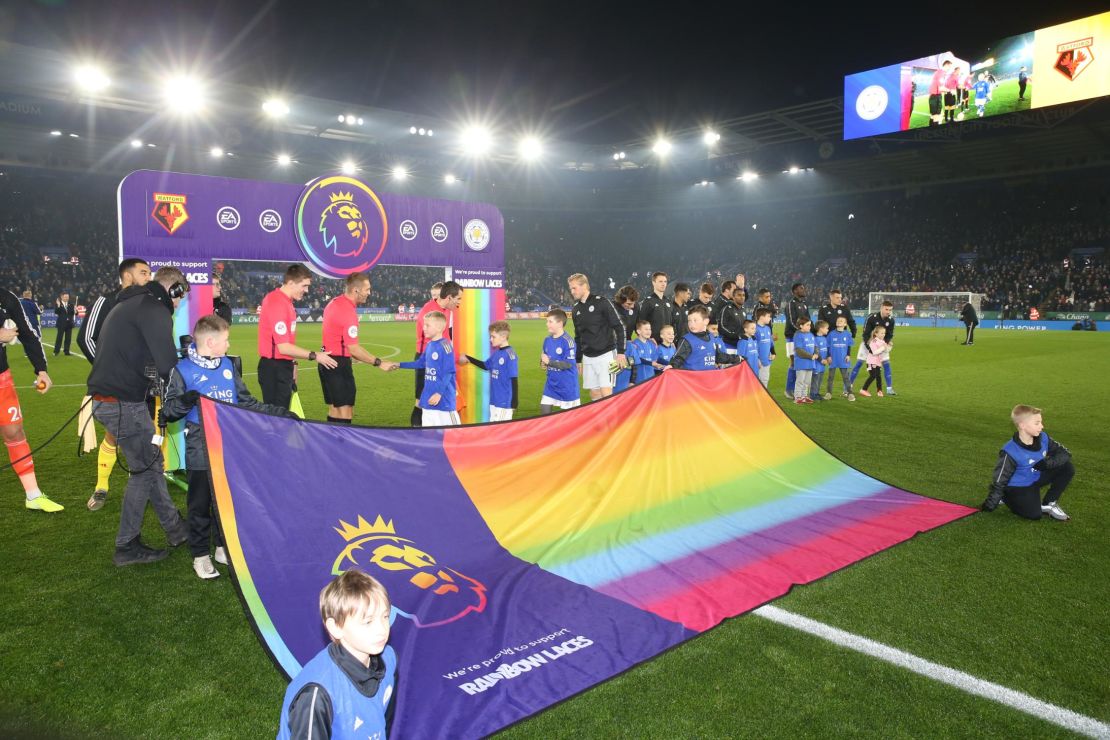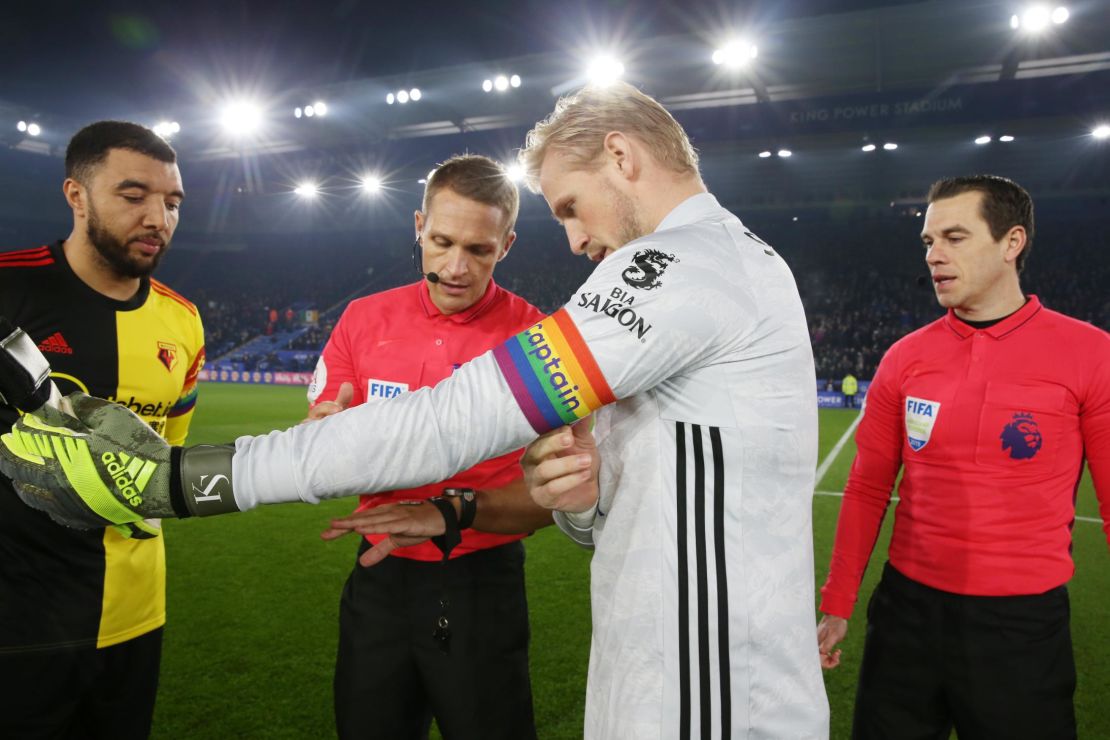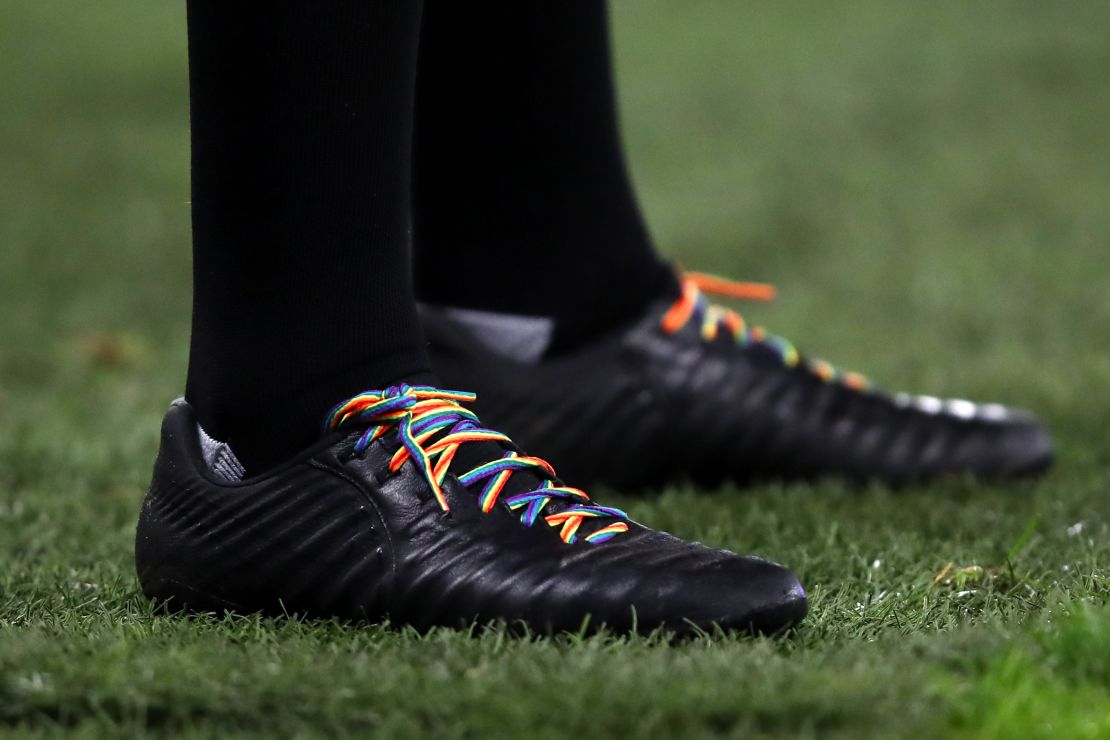When the Premier League kicked off its ‘Rainbow Laces’ campaign to support LGBT people this month, English football’s highest division probably didn’t expect to be flooded with abusive comments and feedback. But that’s what happened.
Right across Twitter, Facebook and Instagram, negative comments and reactions, which were described in one post as “vile,” inundated social media feeds.
One tweet said, “God created Adam and Eve, not Adam and Steve!” While another widely liked Facebook comment read, “Take politics away from this beautiful sport.”
Other comments aimed at clubs supporting the campaign read, “Crystal PalGay,” “SouthGay FC,” and “Why are they [Premier League clubs] forcing us to be homosexuals??”
Whereas in a number of sports and countries, gay athletes have been happy to be open about their sexuality, that hasn’t been the case in English football. At the time of writing, in the Premier League there’s not a single gay player, who has made his sexual orientation public.
And when you look at social media, can you blame them, asked Robbie de Santos, who is Director of Sport of Stonewall, which is Britain’s leading LGBT charity.
“In male sport there is a real absence of openly gay or bi men – we have to create a better environment that is truly LGBT inclusive at all levels,” he told CNN Sport.
This month the Premier League and Stonewall, have collaborated on the ‘Rainbow Laces’ project — to try and stomp out homophobia in the game.
‘Rainbow Laces’ goes far beyond Premier League football, but there is no denying that top-tier English football opens the campaign up to a global audience. The project was inaugurated in 2013.
A large publicity campaign has been in full swing and the rainbow symbol — synonymous with the LGBT movement — has become ubiquitous across English football’s highest division.
It has cropped up on LED boards, armbands on captains of teams, corner flags and even the laces of footballers over the course of two match weeks.
In an attempt to provide a snapshot into how the campaign was received across social media, CNN Sport took a look at Premier League clubs, who rebranded logos in LGBT colors on their Facebook profile pages.
In no way is this an exhaustive demonstration into how ‘Rainbow Laces’ was treated on social media but arguably it gives some insight into how fans and football followers reacted to soccer endorsement of LGBT rights.
CNN Sport focused on gauging the number of likes and angry reactions – because they were the reactions most frequently used by Facebook users.
It is important to outline that reactions on Facebook, labeled in our graphic as “other reactions,” include love hearts, laughing faces, crying faces and shocked faces. Many of the posts we monitored did also receive a high number of these reactions too.
Offended by the rainbow flag? ‘Get a life.’
Both the Premier League and the various clubs that comprise it have worked hard to plug the campaign effectively. And while ‘Rainbow Laces’ seems to have been warmly welcomed by a vast majority of people, social media paints a more complex picture.
In a world of reactions, likes, emojis and hashtags, things can get messy pretty quickly. Just how telling is an angry face emoji?
Well, put it this way, there is no option to dislike something on Facebook, but if you were aiming to show your dissatisfaction with something, the angry face is probably the route to go down.
Our analysis found that as many as 35,000 profiles reacted angrily to the wider Premier League’s rainbow-themed logo change on Facebook.

And on a club level, when Aston Villa showed support for the campaign by also re-branding its logo on Facebook, more than half of the reactions were negative. That’s almost 60% of the accounts that engaged with the post.
When Arsenal and Manchester United did the same thing, more than 50,000 accounts also reacted negatively — again with angry faces.
A club with a smaller fan base, Burnley, also had close to 50% negative reactions.
In fact, across the 19 Premier League clubs who rebranded its logos in solidarity with the LGBT campaign, there have been more than 200,000 negative reactions on Facebook.
One caveat: A few of the rebrands are from previous campaigns and are slightly older, but many are from this month’s ‘Rainbow Laces’ initiative and provide insight into how LGBT issues are received online.
Despite promoting and supporting the campaign across social media, Sheffield United were the only top flight team not to rebrand their logo on Facebook.
Of all the clubs CNN monitored, many had a sizable proportion of negative reactions but both Aston Villa and Burnley had the most.
Burnley confirmed to CNN Sport that around 1,000 people were banned and blocked from Facebook during the promotion of the Rainbow Laces campaign.
“We received an unprecedented number of negative engagements during the campaign – far exceeding anything the club has previously received on its Facebook account,” the club’s Media Manager, Darren Bentley said.
“It appears this was a targeted response from international followers, which isn’t something we have encountered in the past.
“In total, we believe only around 5% of all the negative comments came from users who had actually ‘liked’ our official page, and could reasonably, therefore, be considered as followers of the club in some capacity.
“Any extreme instances of abuse were reported to Facebook. This was in the region of 50 comments. Even though we have experienced negative reactions, we have also had a lot of positive comments, addressing any issues raised in an intellectual and thoughtful manner,” Bentley said.
CNN Sport also reached out to Aston Villa but hadn’t received a response at the time of publication.
While the ‘Rainbow Laces’ campaign was going on there were two incidents of homophobia at Premier League grounds in December.
Everton is currently investigating claims of alleged homophobic chanting in its home win against Chelsea, while Brighton threw out two visiting Wolves fans for homophobic abuse.
Paul Camillin, Brighton and Hove Albion’s Head of Media and Communications, condemned any form of homophobic abuse and called it “ridiculous” that someone should be ostracized from the game simply because of their sexuality.
“If you’re offended by a rainbow flag, you need to get a life,” he told CNN Sport.
Historically, homophobic chants were very common a Brighton’s away games, according to Camillin. He acknowledged that while things had improved, there was still a long way to go and said there were still “massive overtones” of homophobia on social media.
So, this all goes much further than emojis. And abusive comments, posts and tweets have been littered across social media.
Stonewall said its ‘Rainbow Laces’ campaign was all about making sport “everyone’s game.” De Santos said the abusive comments and reactions were “really upsetting to see.”
“It’s a reflection of the issues in society more generally and not just football,” he said. “When you see that level of hatred, it just reminds you why we do this – I don’t think it truly impacts the individual clubs but instead reaffirms why this is really important work,” de Santos told CNN Sport.

‘Rainbow laces is for life not just for Christmas’
The Premier League is adamant that it wants LGBT inclusion and to make sure football is a sport for everyone. What they perhaps didn’t anticipate was the global role they would have in fighting for it — including on social media.
“We respond quickly to any discriminatory responses on our social media posts and have our social media team have been monitoring comments – they remove, report or hide offensive posts,” the Premier League told CNN.
“We also work closely with social media platforms and have met with Twitter and Facebook to discuss and understand how we can work together to tackle unacceptable behavior taking place online.”
While it acknowledged the detractors, the Premier League were keen to emphasize that the campaign has largely been met positively, describing it as having “fantastic support.”
It’s an opinion that is shared by Stonewall’s Robbie de Santos.
“For every step towards equality, you do have detractors … we do generally see a much more positive response compared with the negativity,” de Santos said.
“We have also seen significant shifts in public attitude as a result of the campaign,” he added.

Paul Camillin said the response across Brighton’s social media channels was largely positive and felt there had been a “sea change” this year when it came to LGBT rights.
“Perhaps society is growing up. It was really encouraging to see the response we got on social media. The entire campaign felt like it had momentum behind it and wasn’t simply box ticking.
“If there was abuse we would always report it to the social media companies. We would block individuals and if we could then go on to identify the people responsible, we would ban them. We don’t take it lightly. When we say zero tolerance, we mean zero tolerance.”
The overwhelming response across social media seems to be positive.
For example, of all the clubs CNN Sport monitored who re-branded on Facebook in support of ‘Rainbow Laces,’ only Aston Villa had more negative reactions than positive.
Around 75% of reactions to Chelsea’s rainbow-themed logo were likes, while Tottenham Hotspur had around four times as many likes as angry emojis to their rebranded crest.
Someone who is all-to-aware of Spurs’ effort to support LGBT interests is Proud Lilywhites co-chair, Chris Paouros.
Paouros said members of the LGBTQ+ supporters association linked to Tottenham had been directly upset by the abuse during the campaign and encouraged victims not to engage with “online trolls.”
“The internet is often a safe space for abusers. People often wouldn’t say these things if they were with you in person … don’t feed the trolls,” she said.
“They might not even be a real person. What’s important is people are encouraged to report anything — that’s how we build up a body of evidence against someone.”
Paouros’ appointment as trustee to anti-discrimination organization Kick It Out has allowed her to witness the work being done with social media companies to try and overcome hate, and she indicated more collaboration was going ahead.
And while Twitter didn’t immediately respond to CNN for comment, Facebook Company spokesperson was keen to stress it was working hard to stop abuse on the platform and also Instagram.
“We want our platforms to be a safe and welcoming space for everyone and we do not allow hate speech of any kind,” Facebook told CNN Sport.
“We continue to work with organizations across football on this issue and we encourage our community to continue to report anything that concerns them using our tools,” a Facebook spokesperson told CNN Sport.
READ: Homophobic banners stopped a top-flight soccer match in France
READ: Wembley to host historic match for world’s most successful LGBT club
Although Paouros commended the Rainbow Laces campaign, she said it should “exist in an ecosystem of good work’ in football for the LGBT community.
“We are going to continue to work towards an environment that says you’re welcome here. Football offers that feeling of collective hope, joy and euphoria, I don’t want to deny that to anybody,” she said.
“Rainbow laces is for life not just for Christmas — it’s one thing doing something this week but diversity and inclusion needs to be embedded right into football.”
Brighton’s Paul Camillin said the impact campaign’s such as “Rainbow Laces” can have is huge.
“It’s about educating youngsters. No one is born with a prejudice against a gay man or woman, it comes from the environment they grow up in,” he said. Camillin also suggested the campaign could be having more of a global role than we realize.
Simply, the sight of a rainbow flag during a football game could change “someone’s life” and do a lot for an individual in a country which is less welcoming to LGBT people, he said.
Stonewall’s de Santos told CNN Sport that ‘Rainbow Laces was “here to stay” and was becoming a key part of the sporting calendar.
“The campaign uses sport as a tool to connect with people. We know sport is loved and vital to communities, we want LGBT people to feel just as part of that community – to feel safe, respected and welcome for who they are,” he said.

